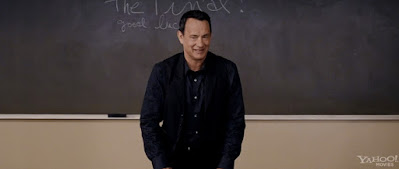 T. Hanks for the Mediocrity
T. Hanks for the Mediocrityor
My Big Fat Career Mistake
I'm sure the intentions were better (aren't they always?), possibly saying something about the displacement of late baby-boomers in the job market, and how "it's never too late to learn" belying the "old dogs/new tricks" canard. Maybe co-writer/director/acting lead Tom Hanks just wanted to make something hopeful and sunny in bad economic times...a flare in the night-sky...the proverbial single candle rather than curse the darkness.
Well, it's more like a candle in the wind, and this blows. Formulaic, with an implied "wah-wah" comedy goose at the end of every scene, Larry Crowne has a "made-for-TV" movie feel that gets under your skin like intravenous sand-paper. Larry (Hanks) is in his early fifties, divorced, a twenty-year Navy vet working at a box-store, where he's received "Employee of the Month" fetes nine times. He's one of those guys who owns everything he does, taking a certain pride in all aspects of his job, even picking up and disposing the stray trash he finds in the parking lot. The implication is already there: while the rest of the world goes on its self-absorbed way, Larry "cares." And that can't come to any good.Called in for what he thinks is his tenth EOTM award, he is fired instead; corporate has crunched the numbers and sees him, as never having gone to college, as not being "advancement" material—he's already been passed over for promotions by duller, but degreed, employees. Adrift, Larry finds no work, and so goes to community college in his '50's, with similar outcasts (though dissimilar aspects) most younger, but without the team-player skills that Larry has acquired.
Teaching one of those classes—Speech 217—is Mercedes Tainot (Julia Roberts), bored, tired, unmotivated, with a dead-beat author-husband (the wonderful Bryan Cranston), who, like Larry at the beginning of the film, doesn't know she's in the process of transitioning, so cynical is her world-view. Her students are an odd collection of rabbits, that she's just trying to keep awake and inspire the one thing she can't seem to muster up—giving a rip. And Crowne is the oddest rabbit in the bunch. She glowers, as she sees him slowly change under the influence of younger students—particularly women, and particularly one student who has it in mind to completely "make-over" Larry to his puzzlement and the vexation of her boyfriend. This area of the movie has more than its share of "wah-wah" moments, and as much fun as Roberts' slow-burn is (and she's great at it), they have the feel of sit-com situations that might be fun for the matinee crowd. It's there that the writing hand of Nia Vardalos, she of My Big Fat Greek Wedding, is the most evident. Hanks and his wife, Rita Wilson (who is also in this with a small, rather frightening part) were the ones who took Vardalos' one-woman show and shepherded the development of it into a Big Fat Success. The demographic for Larry Crowne skews a little bit to the same age, with the same toothless observational satire that never offends, even when it tries to be a little "naughty." It's all for naught.
And yet. And yet...
Hanks and one of his co-studen...
WAIT A MINUTE! That's Rami Malik!
I had the opportunity once to tell a clerk who thought she was "too forward" approaching me in a store aisle: "Take it from an 'old guy:' never regret being delightful." That lesson applies here. Twenty-four hours after "grumping" my way through Larry Crowne, the saccharine had dissolved in my mind and the "good stuff" remained...Larry's unexpected, all-inclusive, concise and perfect final project in class that nicely ties a bow around the movie, a cast of great people getting to be charming (Cedric the Entertainer, Taraji P. Henson—she's a favorite of mine—Wilmer Valderrama—!!, George Takei—!!!, a little spitfire named Gugu Mbatha-Raw—late of "Dr. Who," MI-5, and "Undercovers"—that you just want to hug, and...almost too good to be true...the always-welcome, never-failing Pam Grier). The thing is...for as saccharine as the movie feels going down, it leaves a pretty good after-taste. One forgets just how much one might have suffered through it, and how unsufferable it can be, and is left remembering the good parts. Meaning that Larry Crowne is a similar experience to childbirth.
Not a ringing endorsement...but it could be worse. But, 12 years later, I still remember how good that final class project was. One may gripe. One may be cynical. But, delightful lasts.
Not a ringing endorsement...but it could be worse. But, 12 years later, I still remember how good that final class project was. One may gripe. One may be cynical. But, delightful lasts.



















